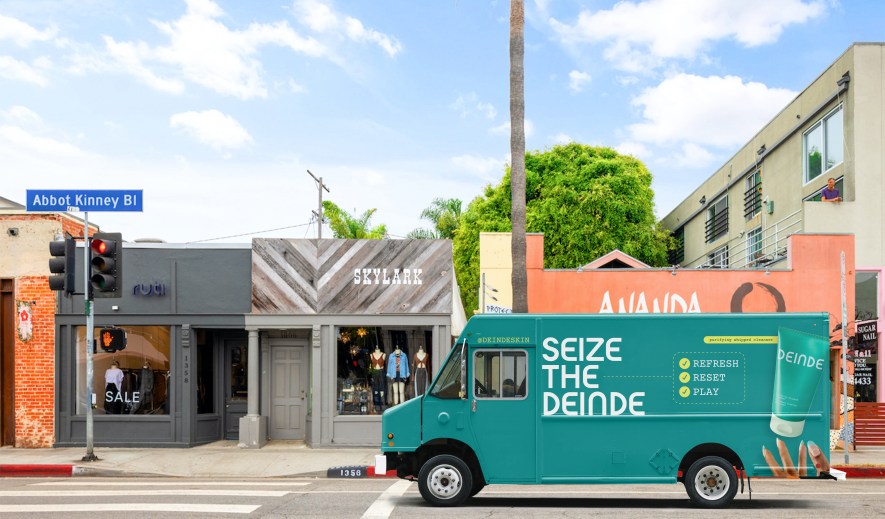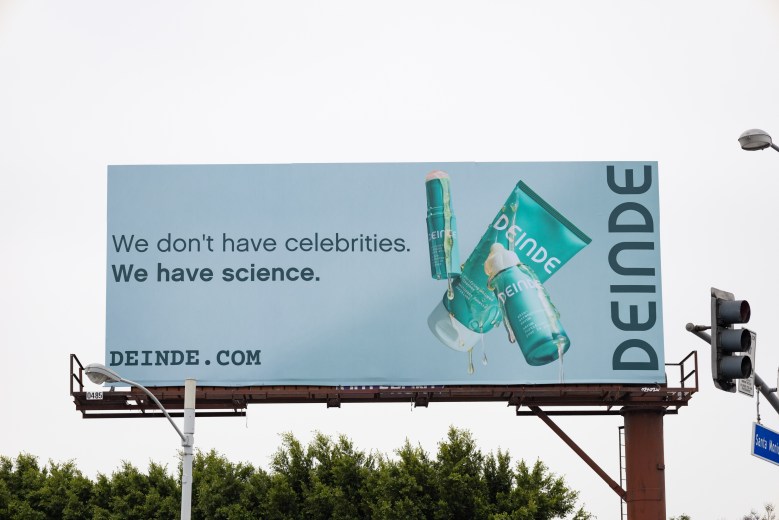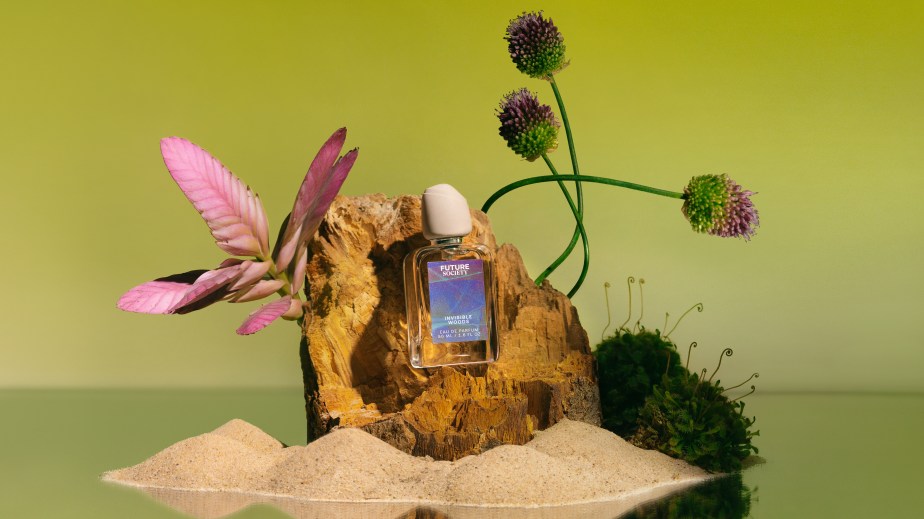Deinde, the 6-month-old skin-care brand from L’Oréal-backed biotech startup Debut, is trying to reach new consumers on the West Coast.
On Monday, the brand will release its second 360-degree campaign and first in Los Angeles, called “seize the Deinde.” It will include OOH activations, a social sweepstakes, paid content partnerships with 100 micro-influencers and the brand’s first connected TV ad, which will run on YouTube.
Pronounced “den-day,” the brand is based on treating low-grade inflammation which is believed to cause five signs of aging, including fine lines, dullness, dryness, and uneven skin tone and texture. The brand sells three products direct-to-consumer: a whipped cleanser for $32, a skin-strengthening serum for $88 and a moisturizing face stick for $36. All three products center around naringenin, a patented niacinamide alternative created with grapefruit peel molecules made through fermentation in a lab.
Deinde was launched in January by Debut, a biotech startup that received $70 million in funding with lead investment from L’Oréal’s Bold science-focused incubator arm.
One of the biggest advantages of biotechnology for skin-care ingredient creation is the ability to create new, novel molecules that aid the skin. It can also boost ingredient volume and purity while decreasing the environmental impact of its sourcing. But messaging the value of synthetic ingredients to consumers accustomed to a natural-is-better approach to skin care is an ongoing challenge for beauty brands using biotech ingredients, and there is a growing number.
According to market research company Grand View Research, the global biotech ingredients market size was $1.61 billion in 2019, and it’s expected to grow at a compound annual growth rate of 9.3% to reach $3.01 billion in 2027.
For its part, Deinde is going after 26-35-year-olds, or “Zillenials,” a group that is increasingly concerned with age-related skin changes while also balancing busy social lives, a brand representative said. “We’re leaning into the insight that our Zillennial consumers view summer as a time to pack in momentous moments and fulfill their summer bucket list,” Dominique Gagnon, vp of consumer brands at Debut, parent company of Deinde, told Glossy. “Zillennials are in search of a powerful and preventative simple skin-care routine.”

To meet Zillennials where they are, Deinde will send a branded taco truck to L.A. hotspots. It will offer free grapefruit agua frescas, tacos and full-size bottles of the whipped facial cleanser in exchange for signups to the brand’s emails and texts. The branded truck will visit Venice Beach to meet late-night partiers and a Silverlake flea market to meet early-morning shoppers over the next two weekends.
“We designed the campaign’s content marketing funnel to capture consumers’ attention in those moments, with a clear presentation of our benefits in refreshing, resetting and sustaining their skin health,” Gagnon told Glossy about the top-of-funnel strategy. “Then we’ll dive deeper into the strength of our science and technology as consumers progress through the funnel.”
Meanwhile, paid content will center around making the most of summer, or “seizing the day. Followers who post coordinating UGC content are entered into a sweepstakes to win $1,000.
While this campaign doesn’t feature OOH advertisements, in order to prime the West Coast consumer for the campaign, the brand just wrapped a three-week rental of one of L.A.’s most recognizable billboards. Situated on the southwest corner of La Cienega and Santa Monica Boulevards in L.A.’s busy West Hollywood neighborhood, the billboard has featured a Kardashian-Jenner brand advertisement for several years. Known around L.A. as “Kylie’s billboard,” it has been discussed online for being vandalized and for new Kylie ad drops through the years.

The content in Deinde’s ad is a play on Kylie’s over-sexualized billboards, which often feature dripping products. It reads, “We don’t have celebrities. We have science.”
“We purposely used images that show our proprietary ingredient, naringenin, dripping from the bottles to kind of echo [the content before] and to clearly state what we’re about, which is science and not celebrities in terms of how our skin care is designed,” Gagnon told Glossy. “It’s been a conversation point with our investors, our consumers and our employees.”
Deinde joins other biotech-backed brands that are getting creative in hopes of standing out in marketing. The goal is to educate consumers about the science that fuels the formulations without overwhelming shoppers.
“Many of the scientists [working in biotech] believe that the hardest part is the science of developing the technologies and developing the innovation, but that’s a bit naive,” said Federico Luna, CMO of Timeline Longevity. “The magic happens when you combine that remarkable innovation with amazing storytelling and brand building.”
Timeline Longevity is the Swiss biotech company that received $66 million in series D funding led by L’Oréal’s Bold biotech incubator earlier this year. The goal of the funding was to scale the company’s skin-care and supplements company. In its oral and topical products made to support the health of the mitochondria in organs’ cells, the brand uses a patented molecule called Mitopure. Its Day Cream sells for $200, and the supplements go for $200 for a two-month supply.

“We have tons of studies, and that enables us to make very strong claims that are backed by placebo-controlled clinical trials,” Luna told Glossy. “We put a lot of work into translating [the test results] and figuring out what our consumer will understand, but also what’s meaningful to our consumer. Just because it’s a meaningful scientific discovery to us, that doesn’t mean [it will mean anything to them].”
He added, “We actually start thinking backward about the skin and health concerns.” In other words, to address customer concerns, like skin aging and brain fog, Luna relies on experts over science-focused copy in its marketing.
“Doctors aren’t just a pretty face on a website with a quote [anymore],” Luna said. For example, Timeline Longevity’s Instagram is packed with doctors, nutritionists, fitness trainers, wellness influencers and customers sharing testimonials in short, direct videos, podcast snippets and simple Q&A-style graphics.
Meanwhile, when Angela Caglia, esthetician and founder of her 7-year-old namesake skin-care brand, brought her latest product to market — the $395 Cell Forté Serum fueled by human mesenchymal stem cells and made by biotechnology — she didn’t expect her customer base to shift so quickly.
“Education was the big thing at launch. We thought, ‘How are we going to make this something a fifth grader can understand?’” Caglia told Glossy. Her strategy included a mix of speaking directly to her clients on social media and sharing consumer-focused newsletters and social graphics using bullet points to speak to the benefits. She focused on the terms “real” and “human” to differentiate the product from the mass and masstige skin-care products featuring plant stem cells.
Through this campaign, she found herself unintentionally reaching the 1% who are already educated about stem cells through exosome RF treatments in derm offices. In addition, the ultra-wealthy often use regenerative medicine to inject stem cells into achy knee and elbow joints.

Caglia exclusively launched the Cell Forté Serum at Violet Grey, which also marketed the launch. It sold out twice, each within an hour each time, Caglia said. “It’s unbelievable — my demographic has completely changed,” she told Glossy. “The average home value [of users buying this serum] is $12 million, and our subscription rate is 51%.” So far, the serum has seen more than $1 million in sales, Caglia said, noting that repeat purchases are often two or three bottles.
Caglia’s line is sold through e-tailers like Amazon Luxury and Dermstore, brick-and-mortar locations including Violet Grey and The Beverly Hills Hotel, and DTC through her Caglia’s spa and the brand’s website. Caglia received seed funding in 2022 and completed a funding round in September of 2023.
For science that’s less recognizable, creating buzzwords can help market the value. For One Skin, the term “zombie cells” — a scientific nickname for inactive senescence cells — has been a successful talking point. One Skin, a line of skin-care basics like sun care and moisturizer, offers a patented ingredient called OS-01 designed to remove senescent cells, or cells that have stopped working, to improve skin health.
“Whenever we are talking about the product, we only focus on cosmetic claims because we have the clinical data to back it up,” said Carolina Reis Oliveira, co-founder and CEO of One Skin. “When we talk about the tech side, then we talk more about the mechanism of how the science works. That’s one way we try to convey the message in a way that doesn’t sound the same as any other company.”
The medium and content type also matter, Alessandra Zonari, co-founder and CSO of One Skin, told Glossy. “Animation is very helpful [for consumers] to visualize the concept of the science,” she said. Meanwhile, she’s found through A/B testing that longer educational content performs better than shorter content in email, but the reverse is true for social media.
One Skin started in 2020 and sells DTC. Its hero product, a face cream called OS-01 Face Topical Supplement, sells for $99. One Skin has raised $14.6 million in funding, according to Pitchbook.

One Skin has four co-founders, all female PhDs. The team regularly turns out explainer blog posts on the brand’s DTC site that educate about all parts of their world, including what it means to publish in a peer-reviewed journal and what certain terms mean. For every social and email campaign, there is a link to learn more, allowing consumers to delve deeper, if desired. “If we make a claim, there is always a link,” said Oliveira.
Then, of course, there are buzzy launches that prioritize creative over scientific messaging.
“Biotech is not the savior of everything,” Jasmina Aganovic, founder of Arcaea, a biotech beauty manufacturer, told Glossy. “That [idea] was a tonal thing for us. We’re not looking to educate people on biotech and try to convert them to this new way of being; we’re trying to be practical about the role products play in people’s lives.”
Arcaea raised $78 million in series A funding in 2021 and purchased an Oregon suncare manufacturer called Gadusol Laboratories in 2022. Chanel is one of the company’s six investors, according to Crunchbase.
For its first attempt at products, Aganovic launched Future Society, a brand of body-care and fragrances in six scent franchises priced between $28-$98. With the launch, Aganovic said she hoped to combine art, creative and biotech into a new way of making products by synthesizing extinct flower DNA from a Harvard lab to scent them. “It’s like ‘Jurassic Park’, applied to fragrances,” she said.

“You just have to be very strategic about where in the consumer journey you place the science,” Aganovic said. “[Trying to educate everyone about biotech] is a very risky and very expensive game. … The easiest way to connect with consumers is a distinctiveness and an emotional connection.”
Aganovic’s team accomplished this goal through bold, colorful creatives reminiscent of “Jurassic Park”’s lush setting and mysterious tone. “If we wanted to be science, science, science, we would have featured every molecule, but the point is to highlight a new creative medium,” Aganovic said. “We found that the extinct flower story — this idea of ‘Jurassic Park’ fragrances — has been a really effective hook. But a lot of people comment about how visually distinctive the brand is and I think that that has been just as important.”




